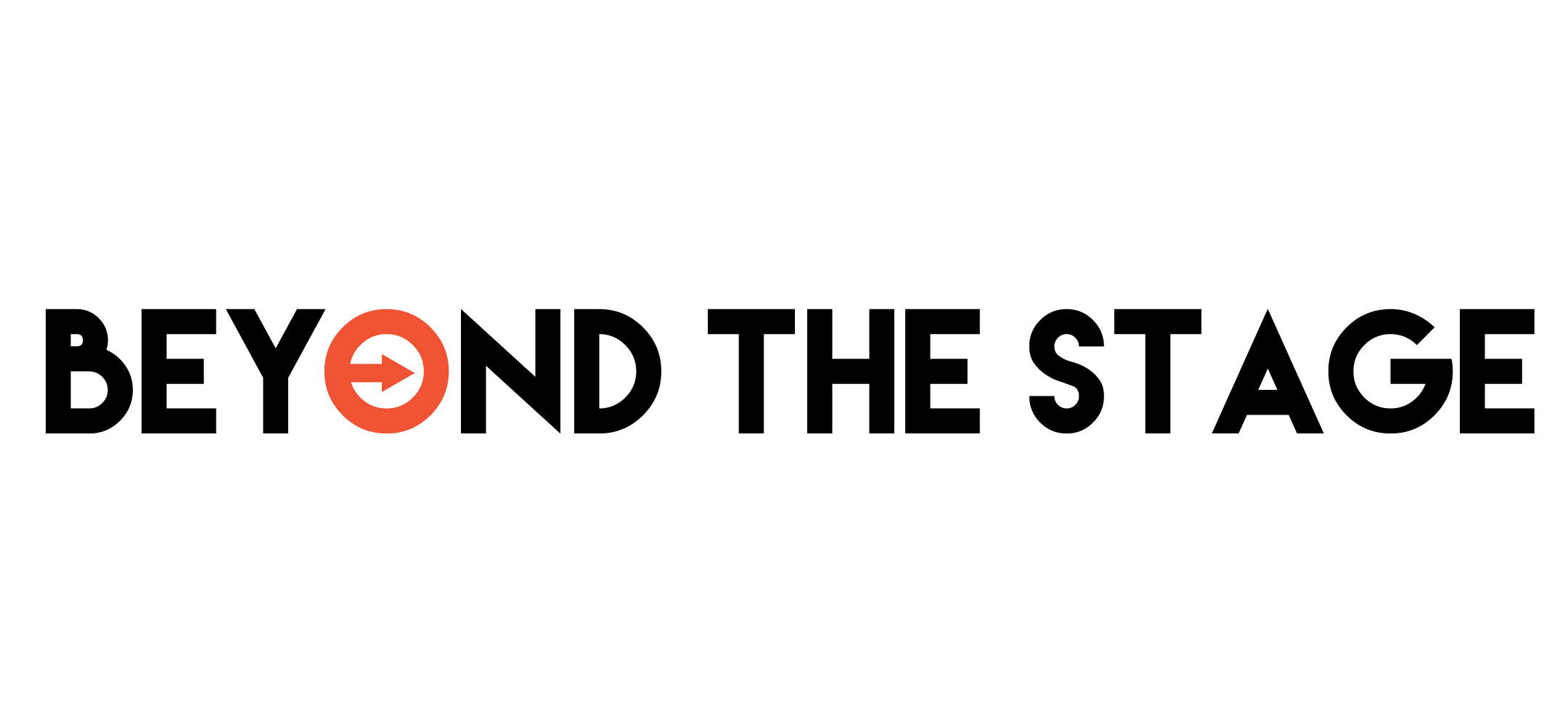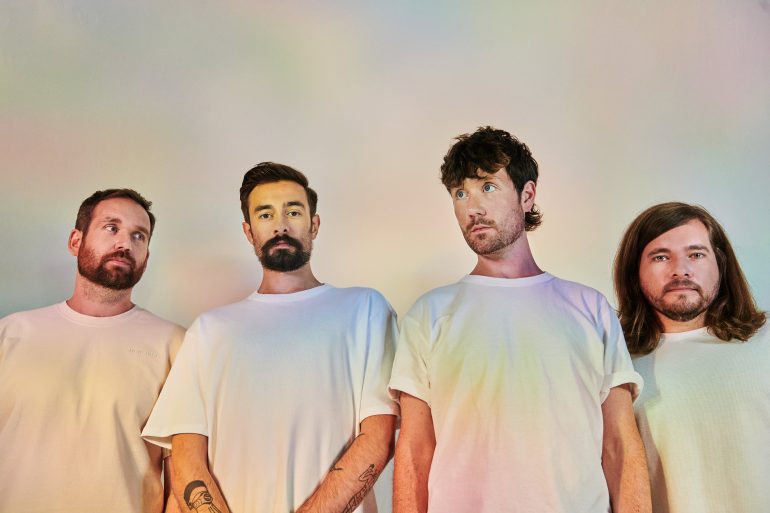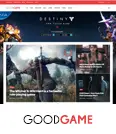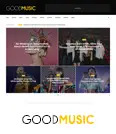
Coming on the heels of the unofficial trilogy of the band’s first three albums, fourth studio album Give Me the Future from British pop band Bastille brings us the most ambitious and brilliantly imagined concept album yet. Known for creating entire worlds around their albums, each record seems to bring a slightly more imaginative and larger world than the previous. Debut album Bad Blood (2013), bedroom project turned certified platinum record, largely singles in on different intimate conversations and stories. Following in 2016 came Wild World, an honest reaction to the events of the world, and the overwhelming feeling of watching more bad news pour in every day. While Bad Blood contained media references that were scattered throughout the album like old artifacts, Wild World took the first dive into the expansion of this concept album, essentially a big mix of films, old documentaries, found footage, weaved throughout the album to both follow and tell the story. The third and final album of the unofficial trilogy, Doom Days, found Bastille at their most brilliant lyrically, following the story of an “apocalyptic night out,” starting at a quarter past midnight and ending the next morning, each track given a timestamp of when it took place throughout the night. Both a response and conclusion to Wild World, Doom Days returned to a more personal and introspective world, centered around the escapism of night life. Stylistically, Dan has compared this album to “Grip,” describing it in an interview with NME as a “slightly nineties looking euphoric party album but in a sort of scuzzy British way that kind of acknowledges that we still live in the same world as we made our last record, if not a slightly more bizarre one.” Doom Days received great critical acclaim, charting in the Top 5 in both the U.K. and U.S., the only U.K. band to have achieved this alongside The Beatles and Queen.
If Doom Days scratches the surface of a slightly more bizarre world, Give Me The Future dives into an entirely new one, as we the transition from an apocalyptic night out to an entirely different kind of escapism in a post-pandemic world—centered around the concept of Futurescape, a fictional device which allows users to live out their dreams in virtual reality, a concept born out of the “desire to escape the nightmarish events of the last 18 months,” Bastille told Rolling Stone UK in an interview.
For the first time ever on an album, Bastille opened the door to work with other collaborators, producers, and writers, such as Ryan Tedder who co-wrote and produced “Distorted Light Beam.” The album also features the likes of a spoken-word response to the album from British award-winning actor, musician, writer, creator, producer, director, and activist Riz Ahmed, as well as tracks like “Stay Awake,” and “Back To The Future” which were co-written with legendary songwriter Rami Yacoub. Laced with 80’s influences, the album nods to artists like Phil Collins, The Police, Daft Punk, Paul Simon, among others.
With this fourth album, Bastille has found a way to perfectly blend a future that is already here with influences, tributes, and snippets of the past into these infectious, danceable dreamscapes, inside this perfect virtual reality. Laced with references to other apocalyptic, dystopian media, this album seems to be a double-edged sword—whilst the album explores the concept of escaping into this virtual reality created by the fictional yet familiar Future Inc., the literary references journal the way that our interactions with media are often their own means of escapism as well—a world where these references are both a vehicle for the story of the album and perhaps a core aspect of the escapism itself. Along with the glimpses into this futuristic world from the accompanying music videos released so far, Bastille also launched a dream analyzer, an AI engine that will collect and analyze the dreams submitted, combining them into a collective visual dreamscape.
Within Futurescape these songs weave together creating this world, mirroring the way the state of the world weaves itself into our daily lives, our outlooks, and our future juxtaposed as our two options of accepting reality and witnessing the hellish state of the world, or escaping into an entirely different one instead. In track five “Back to the Future,” co-written with Rami Yacoub and littered with references to dystopian 80’s media such as the likes of Huxley’s Island, George Orwell’s 1984, and the 1982 sci-fi film Bladerunner, the song opens with:
“Feels like we danced into a nightmare
We’re living 1984
If Doublethink’s no longer fiction
We’ll dream of Huxley’s Island shores”
The fourth track that precedes this, “Brave New World (Interlude),” shares the title with an earlier work by Huxley—namely, the very book that was the predecessor to the aforementioned work Island. Filled with 80’s influences, a driving beat, and a euphoric alt-pop chorus, “Back to the Future,” provides the perfect example of what this trip into Futurescape sounds like.
At the culmination of these literary references and the world they build, this concept of Futurescape comes into focus—but there also seems to be a scope offered that goes beyond that, digging a little into the undercurrent of how this all ties together across time and the worlds built in previous albums. In the second track of the album, “Thelma & Louise,” a tribute to the iconic feminist film on its 20th anniversary, asks in the chorus: “Can you hear the sound of my heart exploding?”
A line seemingly very reminiscent of the chorus of “Laura Palmer,” off Bad Blood—inspired by Twin Peaks and driven by a constant bass drum beat meant to simulate a heartbeat—which inquires: “This is your heart / Can you feel it?”
Perhaps the similarities were unintentional, perhaps the fact that both songs reference media released in the same year (1991) is purely coincidence, or perhaps this serves as the perfect example of this need to look to the media we consume to rationalize our own experiences, or create meaning in these stories as we escape into them.
Give Me The Future delves into this concept of escapism in a way we haven’t quite seen in previous albums from Bastille—as more of an urgent, almost necessary coping mechanism, while also offering a new level of self-awareness than before. As seen in the eight track and fifth single off the album, “Shut off the Lights,” where we take a break from this virtual dreamscape to acknowledge that nothing can truly measure up to sharing a moment of genuine human connection. In the track immediately following, “Stay Awake,” we’re immediately pulled back to reality—or rather the lack of desire to face reality as the returning pulse of the chorus muses “why would I stay awake?” In a way, this jumbled view of bouncing back and forth between the goods and evils of a perfect augmented reality, seems to mirror the struggles faced in reality when it feels like there’s no longer any good options, when our collective fate hangs in the balance of world leaders who choose not to see, or care. The 6th track “Plug In…” brings an introspective rumination on both the dangers and pleasures of escaping into these virtual realities while the world burns around us, in a style quite reminiscent of the title track off Doom Days. The haunting question of the chorus echoing: “Say that we’ll be fine / Lie to me it’s alright… right?”
The significantly more self-reflective nature of Give Me the Future, seems to be more crucially aware that this virtual reality will not make the hellish reality around us go away, but offers as an alternative the idea that sometimes all we have is holding onto the few moments of joy we can find, real or not. We see this all in the conclusion of the album on final track 13 “Future Holds,” the raw, open-ended final track, featuring BIM and stylistically almost reminiscent of the re-orchestrated tracks from previous years, which grapples with just how unpredictable the future is from this point out. A track that is about as disparaging as it is brutally honest–focused on letting go of control, and admitting how collectively lost we all are, echoed in lines like “Don’t lose sleep over the truth / We can’t find it” and “Their happy ending myth / I’d settle for religion.” Ending on the chorus featuring BIM is the conclusion: “Who knows what the future holds? / Doesn’t matter if I got you.” The stark contrast between the open-ended conclusion of this album vs. Doom Days slightly more optimistic conclusion “Joy,” is perhaps the largest indication of just how much has changed since the release of Doom Days in 2019.
Give Me The Future chronicles escapism with no compass, no cheat sheet, no magical solutions to all our problems. A world where you might as well escape into the danceable hooks of each track, because who does know what the future holds, at this point.
Set to release on February 4th, Give Me The Future’s 80’s-infused, intricately-woven, perfectly danceable track list promises a welcome escape into the virtual reality of Futurescape. For fans of Bastille’s previous album releases, Give Me The Future provides a new adventure into a dystopian, dream-like pop experience similar and yet expanded into a larger world than previous records. With a small glimpse of the visuals released so far detailing the world of Futurescape, we can’t wait to see what’s in store for their live sets to bring this dreamscape to life as they embark on the Give Me The Future Tour across the UK and the US this spring and summer.
Pre-order/save Give Me The Future
- PHOTOS: Joyce Manor – Chicago, IL – 12/11/2024 - December 18, 2024
- PHOTOS: Knocked Loose – Chicago, IL – 11/1/24 - November 8, 2024
- Riot Fest 2024 Lineup is here! - June 12, 2024








